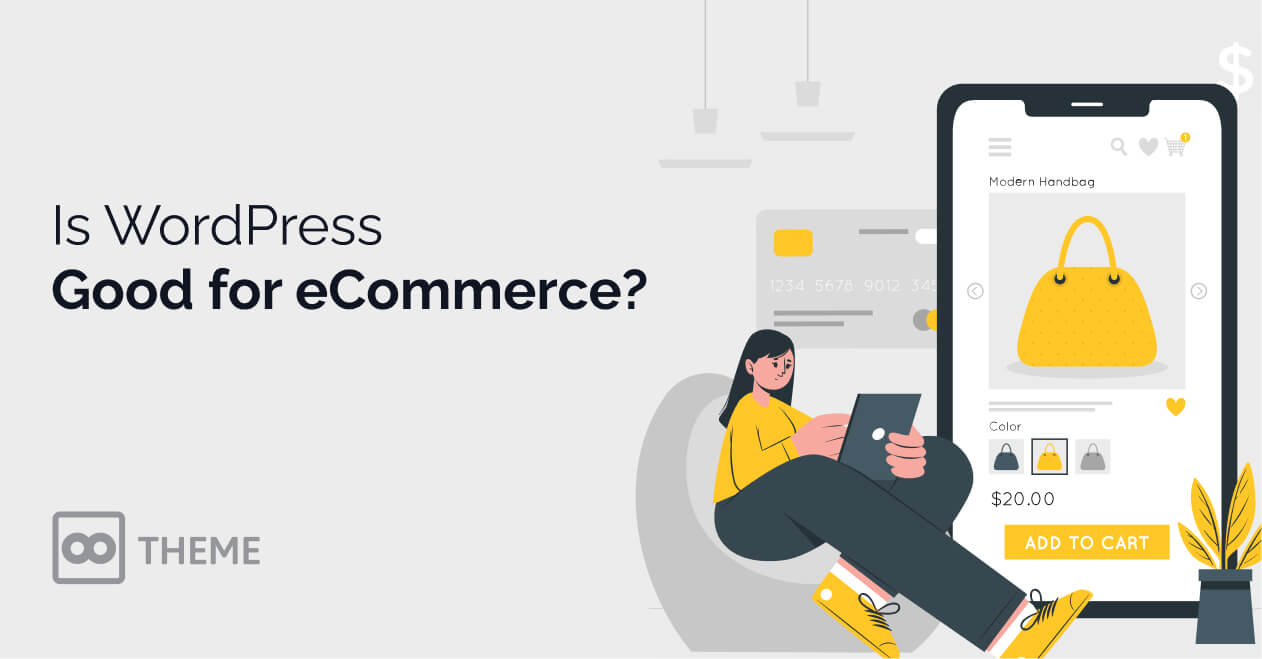
When building an online store, many question whether or not WordPress is a good platform for eCommerce.
Well, is it?
That's what we will discuss in this article through the pros and cons of using WordPress for eCommerce.
In addition to that, we'll also share a few alternatives so you'll make the final decision much easier.
Let's face it: starting an online store can be both exciting and overwhelming, especially if you're new to building websites and eCommerce.
So, let's check if WordPress is the right fit for your venture.
Easy to learn: WordPress is designed for beginners.
Its intuitive dashboard allows you to navigate through different sections of your website without hassle.
You don't need to be a tech guru to add new products, create blog posts, or update pages.
No coding is necessary.
Content management made simple: Managing your store's content is straightforward.
You can easily organize your products into categories, add images, and write descriptions.
The visual editor is similar to common word processing software, making it familiar territory for most users.
Themes and templates: One of WordPress's biggest strengths is its vast selection of themes.
Whether you're selling handmade crafts or high-tech gadgets, there's a theme that suits your brand.
You can choose from thousands of free and premium themes that are easily customizable to match your style.
Plugins for extended functionality: Need a specific feature? There's probably a plugin for that.
WordPress repository offers a massive library of plugins that can add functionality to your site without coding.
Plugins make it easy to enhance your store, from contact forms and social media integrations to advanced SEO tools and lead capturing.
Free to start: The core WordPress software is free to download and use.
This means you can allocate more of your budget to other areas like marketing or product development.
Affordable hosting: Many hosting providers offer budget-friendly WordPress-specific plans.
Thus, you can get your site up and running without breaking the bank.
Built-in features: WordPress is designed with clean code and follows best practices for SEO (Search Engine Optimization).
Many themes are mobile-responsive (must!), which is a critical factor for search engine rankings.
SEO plugins: Plugins like Yoast SEO and All in One SEO Pack help you optimize your content for search engines.
They provide suggestions for improving your meta descriptions, keyword usage, and readability.
Note that even the free version of these plugins is sufficient to get your eCommerce website ranking.
Forums and tutorials: WordPress powers a significant portion of the web, so it's no secret that a massive community of users and developers is available to everyone.
This means you have access to countless tutorials, forums, and guides to help you troubleshoot issues or learn new features.
Regular updates: WordPress is continually updated to improve security and functionality.
These updates are usually easy to implement and help keep your site running smoothly.
Regular updates needed: While updates are beneficial, they require your attention.
You must update the WordPress core, themes, and pluginsly to ensure security and compatibility.
(Don't use themes and plugins that aren't updatedly.)
Backups and security measures: Unlike some hosted platforms, you're responsible for your site's backups and security.
This means you'll need to install security plugins and possibly invest in backup solutions to protect your data. (Luckily, some hosting providers take care of this.)
Learning curve: While WordPress is user-friendly, setting up an eCommerce store adds layers of complexity.
You may need time to understand how different plugins work together and how to configure them properly.
Customization challenges: Advanced customizations might require coding knowledge.
If you want a highly unique design or functionality that's not covered by existing themes or plugins, you might need to hire a developer.
Conflicts between plugins: With so many available plugins, not all work well together.
Installing multiple plugins can sometimes cause conflicts that cause parts of your site to malfunction.
Quality variations: Plugins are developed by different individuals or companies, leading to variations in quality.
Some plugins may not be well-maintained or could pose security risks. (Check ratings and read reviews before installing.)
A common target for hackers: Due to its popularity, hackers often target WordPress sites. Yes, without proper security measures, your site could be at risk.
Need for additional security plugins: To enhance your site's security, you'll likely need to install security plugins, which can add to the complexity and require ongoing management.
But you don't have to complicate it if you are running a small online store or just starting out. Kick it off with a free security plugin and only upgrade when needed.
Site speed concerns: A WordPress site can become slow if not correctly optimized, especially as you add more plugins and content.
Requires caching and optimization: Improving site speed may require the use of caching plugins and other optimization techniques.
This can be technical and may require additional effort to implement effectively.
If you're unsure whether WordPress is the right choice, there are many dedicated eCommerce platforms designed specifically for online stores. These are our favorites:
Remember, you can easily set up a test site on WordPress to explore its features. Many hosting providers offer trial periods or money-back guarantees.
Finally, determine what's most important for your business: control and customization, ease of use, scalability, or cost.
Choosing the right platform for your eCommerce store is a significant decision that can impact your business's success.
WordPress offers a flexible and customizable solution that's cost-effective and supported by a large community.
However, it requires hands-on management and a willingness to tackle technical aspects like maintenance and security.
In short, if you value control over your website and are willing to invest time in learning how to manage it, WordPress can be a powerful tool for your eCommerce needs.

Did you know ?
One standard license is valid only for 1 project. Running multiple projects on a single license is a copyright violation.
